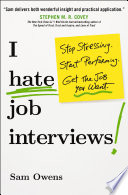

Traditional job interviews often rely on outdated methods that fail to accurately assess a candidate's abilities or fit for the role. The book argues that interviews are largely subjective and can be influenced by biases, leading to poor hiring decisions. The author emphasizes that many interviewers focus on surface-level attributes rather than deeper competencies, which can result in mismatches between candidates and positions. This misalignment can cost companies time and money and can also lead to employee dissatisfaction and turnover. By recognizing the limitations of traditional interviews, both candidates and employers can explore alternative methods that provide a more holistic view of a candidate's potential.
Continue readingPreparation is key to overcoming the anxiety associated with job interviews. The book provides practical strategies for candidates to prepare effectively, including researching the company, understanding the job description, and practicing common interview questions. The author suggests that candidates should also prepare their own questions to ask interviewers, which demonstrates engagement and interest in the role. By preparing thoroughly, candidates can present themselves more confidently and articulate their qualifications more effectively. The book emphasizes that preparation is not just about rehearsing answers but also about understanding one's own strengths and weaknesses.
Continue readingThe book advocates for shifting the paradigm of job interviews from a one-sided interrogation to a two-way conversation. This approach encourages candidates to engage with interviewers in a more authentic and relaxed manner. By treating the interview as a dialogue, candidates can showcase their personality and cultural fit while also assessing whether the company aligns with their values and career goals. This conversational style can lead to a more meaningful exchange of information, allowing both parties to determine if there is a mutual fit. The author provides techniques for initiating this dialogue, which can help reduce the pressure often associated with interviews.
Continue readingA critical aspect of job interviews is understanding the company culture and how it aligns with a candidate's values and work style. The book emphasizes the importance of researching company culture, which can include aspects such as work-life balance, management styles, and team dynamics. By understanding the culture, candidates can tailor their responses to demonstrate how they would thrive in that environment. Additionally, the author encourages candidates to consider their own values and how they align with the company's mission and vision. This mutual understanding can lead to a more satisfying and productive working relationship.
Continue readingNetworking plays a crucial role in the job search process, as many job opportunities arise through personal connections rather than traditional job postings. The book highlights the importance of building and maintaining a professional network, which can provide valuable insights into companies and job openings. The author suggests strategies for effective networking, including attending industry events, leveraging social media, and reaching out to alumni. By cultivating relationships within their field, candidates can gain access to unadvertised positions and receive referrals, which can significantly enhance their chances of landing a job.
Continue readingFeedback is a vital component of the job interview process, whether it comes from interviews that did not lead to job offers or from mentors and peers. The book encourages candidates to seek constructive feedback to identify areas for improvement in their interviewing skills. By embracing a mindset of continuous learning, candidates can refine their approach and become more effective in future interviews. The author provides practical tips for soliciting feedback and using it to enhance performance, which can ultimately lead to greater success in securing job offers.
Continue readingRejection is an inevitable part of the job search process, and the book emphasizes the importance of reframing rejection as an opportunity for growth rather than a personal failure. The author encourages candidates to view each interview experience as a learning opportunity that can provide insights into their strengths and weaknesses. By adopting a resilient mindset, candidates can maintain their motivation and confidence throughout the job search process. The book offers strategies for coping with rejection and using it as fuel for future success, highlighting that persistence and adaptability are key traits in achieving career goals.
Continue readingThe reading time for I Hate Job Interviews depends on the reader's pace. However, this concise book summary covers the 7 key ideas from I Hate Job Interviews, allowing you to quickly understand the main concepts, insights, and practical applications in around 20 min.
I Hate Job Interviews is definitely worth reading. The book covers essential topics including The Flawed Nature of Traditional Interviews, The Importance of Preparation, Transforming the Interview into a Conversation, providing practical insights and actionable advice. Whether you read the full book or our concise summary, I Hate Job Interviews delivers valuable knowledge that can help you improve your understanding and apply these concepts in your personal or professional life.
I Hate Job Interviews was written by Sam Owens.
If you enjoyed I Hate Job Interviews by Sam Owens and want to explore similar topics or deepen your understanding, we highly recommend these related book summaries:
These books cover related themes, complementary concepts, and will help you build upon the knowledge gained from I Hate Job Interviews. Each of these summaries provides concise insights that can further enhance your understanding and practical application of the ideas presented in I Hate Job Interviews.